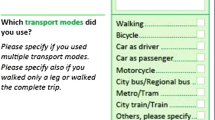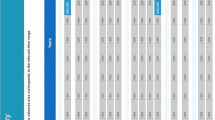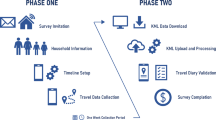Abstract
Household activity scheduling is widely regarded as the underlying mechanism through which people respond to emerging travel demand management policies. Despite this, very little fundamental research has been conducted into the underlying scheduling process to improve our understanding and ability forecast travel. The experimental survey approach presented in this paper attempts to fill this gap. At the core of the survey is a Computerized Household Activity Scheduling (CHASE) software program. The program is unique in that it runs for a week long period during which time all adult household members login daily to record their scheduling decisions as they occur over time. An up-front interview is used to define a household's activity agenda and mode availability. A sample of 41 households (66 adults and 14 children) was used to assess the performance of the survey. Analysis focuses on times to completion, daily scheduling steps, activity-travel patterns, and scheduling time horizons. Overall, the results show that the computer-based survey design was successful in gathering an array of information on the underlying process, while minimizing the burden on respondents. The survey was also capable of tracing traditionally observed activity-travel outcomes over a multi-day period with minimal fatigue effects. The paper concludes with a detailed discussion on future survey design, including issues of instrument bias, use of the Internet, and improved tracing of spatial behaviour. Future use of the survey methodology to enhance activity-travel diary surveys and stated responses experiments is also discussed.
Similar content being viewed by others
References
Axhausen K & Gärling T (1992) Activity-based approaches to travel analysis: conceptual frameworks, models, and research problems. Transport Reviews 12(4): 323-341.
Axhausen KW (1998) Can we ever obtain the data we would like to have? In: Gärling T, Laitila T & Westin K (eds) Theoretical Foundations of Travel Choice Modeling (pp 305-323). Oxford: Elsevier Science Ltd.
Bowman JL & Ben-Akiva M (1997) Activity-based travel forecasting. In: Summary, Recommendations and Compendium of Papers from the Activity-based Travel Forecasting Conference, held June 2-5, 1996 (pp 3-36). Sponsored by the Travel Model Improvement Program.
Brög W & Erl E (1983) Application of a model of individual behaviour (situational approach) to explaining household activity patterns in an urban area and to forecast behavioural changes. In: Carpenter S & Jones P (eds) Recent Advances in Travel Demand Analysis (pp 350-370). 3-33. Aldershot: Gower.
Ettema D & Timmermans H (1997) Theories and models of activity patterns. In: Ettema D & Timmermans H (eds) Activity-based Approaches to Travel Analysis (pp 1-36). Oxford: Pergamon.
Ettena D, Borger A & Timmermans H (1993) Simulation model of activity scheduling behavior. Transportation Research Record 1413: 1-11.
Ettema D, Borgers A & Timmermans H (1994) Using interactive computer experiments for identifying activity scheduling heuristics. Paper presented at the Seventh International Conference on Travel Behaviour, Santiago, Chile, June 13-16.
Gärling T, Gillholm R & Gärling A (1998) Reintroducing attitude theory in travel behavior research: The validity of an interactive interview procedure to predict car use. Transportation 25(2): 129-146.
Gärling T, Kwan M & Golledge R (1994) Computational-process modelling of household activity scheduling. Transportation Research 28B(5): 355-364.
Hayes-Roth B & Hayes-Roth F (1979) A cognitive model of planning. Cognitive Science 3: 273-310.
Jones P, Bradley M & Ampt E (1989) Forecasting household response to policy measures using computerised, activity-based stated preference techniques. In: Travel Behaviour Research (pp 41-63). Aldershot: Avebury.
Jones P, Koppelman F & Orfeuil JP (1990) Activity analysis: State-of-the-art and future directions. In: Jones P (ed) Developments in Dynamic and Activity-Based Approaches to Travel Analysis (pp 34-55). Aldershot: Avebury.
Kitamura R (1988) An evaluation of activity-based travel analysis. Transportation 15: 9-34.
Lawton TK & Pas EI (1996) Resource paper for survey methodologies workshop. In the proceedings: Household Travel Surveys: New concepts and Research Needs, Irvine, California, March 12-15, 1995 (pp 134-153). Transportation Research Board Conference Proceedings 10.
Lee-Gosselin M (1989) In-depth research on lifestyle and household car use under future conditions in Canada. In: Travel Behaviour Research (pp 102-118). Aldershot: Avebury.
Lee-Gosselin M (1996) Scope and potential of interactive stated response data collection methods. In the proceedings: Household Travel Surveys: New concepts and Research Needs, Irvine, California, March 12-15, 1995 (pp 115-133). Transportation Research Board Conference Proceedings 10.
Mokhtarian PL & Salomon I (1997) Emerging travel patterns: Do telecommunications make a difference? In the proceedings: The Eighth Meeting of the International Association of Travel Behaviour Research: Challenges and Opportunities in Travel Behaviour Research and Applications, Austin, Texas, September 21-25.
Murakami E & Wagner DP (this issue) Comparison between computer-assisted self-interviewing using GPS with retrospective trip reporting using telephone interviews. Transportation.
Pas EI (1985) State-of-the-art and research opportunities in travel demand: another perspective. Transportation Research A 19: 460-464.
Stopher P (1996) Household travel surveys: Cutting-edge concepts for the next century. In the proceedings: Household Travel Surveys: New concepts and Research Needs, Irvine, California, March 12-15, 1995 (pp 11-23). Transportation Research Board Conference Proceedings 10.
Svenson O (1989) Eliciting and analyzing verbal protocols in process studies of judgement and decision making. In: Montgomery H & Svenson O (eds) Process and Structure in Human Decision Making (pp 65-81). Toronto: John Wiley & Sons.
Vause M (1997) A rule-based model of activity scheduling behavior. In: Ettema D & Timmermans H (eds) Activity-based Approaches to Travel Analysis (pp 73-88). Oxford: Pergamon.
Author information
Authors and Affiliations
Rights and permissions
About this article
Cite this article
Doherty, S.T., Miller, E.J. A computerized household activity scheduling survey. Transportation 27, 75–97 (2000). https://doi.org/10.1023/A:1005231926405
Issue Date:
DOI: https://doi.org/10.1023/A:1005231926405




